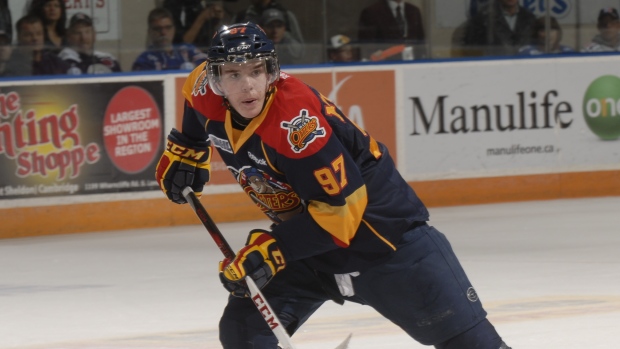Nov 12, 2014
Button: McDavid should not be fighting, ever
Connor McDavid should not be fighting, ever. A game built on warp-like speed and quickness, brilliant puckhandling abilities and a mind that processes the game at speeds only seen in Silicon Valley, should not include fisticuffs. TSN Director of Scouting Craig Button talks about the hand injury to the OHL's premier player and explains why the cost of fighting is obvious.
By Craig Button

Connor McDavid should not be fighting, ever.
A game built on warp-like speed and quickness, brilliant puckhandling abilities and a mind that processes the game at speeds only seen in Silicon Valley, should not include fisticuffs.
The argument that he is standing up for himself doesn't hold when you consider the impact he has in the game. That impact is lost when he isn't available whether it is for five minutes or for weeks if he suffers an injury.
Let's look at the cost-benefit analysis. The benefits are numerous. He produces points, he makes everybody around him better and he gives the team a great chance to win. Erie's record is 16-1-1, and the excitement he brings to the fans both at home and on the road is measured in ticket revenue.
The cost is obvious and fighting, which in and of itself poses definitive risk of injury, offers no benefit. He will continue to draw close checking, even opposing players running at him and potentially the odd cheap shot and him fighting – as he has now done twice this season - will do nothing to stop that.
He may derive satisfaction from it, but my feeling is he derives considerably more satisfaction from playing and being the dominant player he has become. McDavid entered action Tuesday vs. Mississauga averaging 2.9 points per game, better than the full year scoring marks of OHL single season points record-holder Bobby Smith (2.8), Wayne Gretzky (2.7) and Eric Lindros (2.6).
McDavid and fans are deprived of the chance to see him go for the history books.
When you are a star player, attention on and off the ice is to be expected. As a major junior player, McDavid is in the same stratosphere as Gretzky and Sidney Crosby – and there is no record of either of them fighting in the CHL.
Do opponents target the best players? Yes, but those players respond in a manner that is far more damaging to an opponent. They beat them up with their enormous skills and leave the game victorious knowing the best response was through their play.
Emotion is part of the game and, at times, they get the better of players - even superstars, but it is not a reason to fight when the cost is so much greater than the benefit.
Erie Otters' head coach Kris Knoblauch lost Joel Wigle, a top 6 right winger who is expected to provide finish, to a broken hand as the result of a fight in the first game of the season; Wigle has not played since. McDavid witnessed that and referenced it as a reason not to get involved in fisticuffs when asked by Bob McKenzie in late September if he ever expected to fight. You can watch that interview here.
You can imagine how Knoblauch feels losing McDavid to a fight with Mississauga's Bryson Cianfrone, a second-year Steelhead who until Tuesday had never fought in the OHL or earned a penalty minute this season.
We hear, "You can't take the emotion out of the game and competitiveness is what makes him special," and on it goes but the reality is that being smart is just as important. More important.
I don't think Team Canada head coach Benoit Groulx is extolling the virtues of standing up for yourself and fighting because he knows full well the impact of potentially losing McDavid as does Kris Knoblauch.
What does it mean for Team Canada? Every country has injuries and many countires have eligible players in NHL, but as the host country endeavouring to end a five-year gold drought (and two years without a medal), here are who will or could be missing from Team Canada: McDavid, Sam Bennett, Aaron Ekblad, Jonathan Drouin, Nate MacKinnon, Curits Lazar, Bo Horvat and Anthony Duclair.
Canada has great depth, will ice a very good team and understands all too well that each year there will be certain players not available because of their ability to perform well at a young age in the NHL. But while others are unavailable due to being in the NHL, McDavid may find himself on the sidelines due to entirely different reason and that makes Canada a little less formidable.
Performing outside your abilities and strengths is never something any coach encourages and whether it was in the heat of the moment or not, Connor McDavid did something you rarely see him do on the ice - make a mistake.

